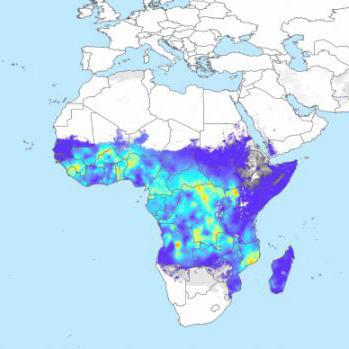Search
Research
Modelling to support Australia's COVID-19 responseNick Golding BSc DPhil Honorary Research Fellow Nick.Golding@thekids.org.au Honorary Research Fellow Professor Nick Golding is the UWA Chair in
Research
The Vector AtlasThe Vector Atlas aims to update and create vector species maps and spatial products that improve disease prediction, mitigation and preparedness.

The Infectious Disease Ecology and Modelling team led by Professor Nick Golding, combines mathematical and statistical modelling, ecology, and public health to address malaria and other infectious and vector-borne diseases. The team uses modelling and maps to measure the risk posed by some of the world’s most important and neglected diseases – including malaria, Japanese Encephalitis and COVID-19 – and provide rapid modelling analyses to policy makers.
Research
COVID-19 vaccine coverage targets to inform reopening plans in a low incidence settingSince the emergence of SARS-CoV-2 in 2019 through to mid-2021, much of the Australian population lived in a COVID-19-free environment. This followed the broadly successful implementation of a strong suppression strategy, including international border closures. With the availability of COVID-19 vaccines in early 2021, the national government sought to transition from a state of minimal incidence and strong suppression activities to one of high vaccine coverage and reduced restrictions but with still-manageable transmission.
Research
Estimating measures to reduce the transmission of SARS-CoV-2 in Australia to guide a ‘National Plan’ to reopeningThe availability of COVID-19 vaccines promised a reduction in the severity of disease and relief from the strict public health and social measures (PHSMs) imposed in many countries to limit spread and burden of COVID-19. We were asked to define vaccine coverage thresholds for Australia's transition to easing restrictions and reopening international borders.
Research
Characterization and individual-level prediction of cognitive state in the first year after ‘mild’ strokeMild stroke affects more than half the stroke population, yet there is limited evidence characterizing cognition over time in this population, especially with predictive approaches applicable at the individual-level. We aimed to identify patterns of recovery and the best combination of demographic, clinical, and lifestyle factors predicting individual-level cognitive state at 3- and 12-months after mild stroke.
Research
Missing data: current practice in football research and recommendations for improvementA survey of 136 articles published in 2019 (sampled at random) was conducted to determine whether a statement about missing data was included.
Research
Estimating the potential malaria morbidity and mortality avertable by the US President's Malaria Initiative in 2025: a geospatial modelling analysisSince its inception in 2005, the US President's Malaria Initiative (PMI) has played a major role in the reductions in malaria morbidity and mortality observed across Africa. With the status of PMI funding and operations currently uncertain, we aimed to quantify the impact that a fully functioning PMI would have on malaria cases and deaths in Africa during 2025.
Research
Predicting immune protection against outcomes of infectious disease from population-level effectiveness data with application to COVID-19Quantifying the extent to which previous infections and vaccinations confer protection against future infection or disease outcomes is critical to managing the transmission and consequences of infectious diseases. We present a general statistical model for predicting the strength of protection conferred by different immunising exposures (numbers, types, and strains of both vaccines and infections), against multiple outcomes of interest, whilst accounting for immune waning.
Research
Expanding Tidy Data Principles to Facilitate Missing Data Exploration, Visualization and Assessment of ImputationsDespite the large body of research on missing value distributions and imputation, there is comparatively little literature with a focus on how to make it easy to handle, explore, and impute missing values in data. This paper addresses this gap. The new methodology builds upon tidy data principles, with the goal of integrating missing value handling as a key part of data analysis workflows.
